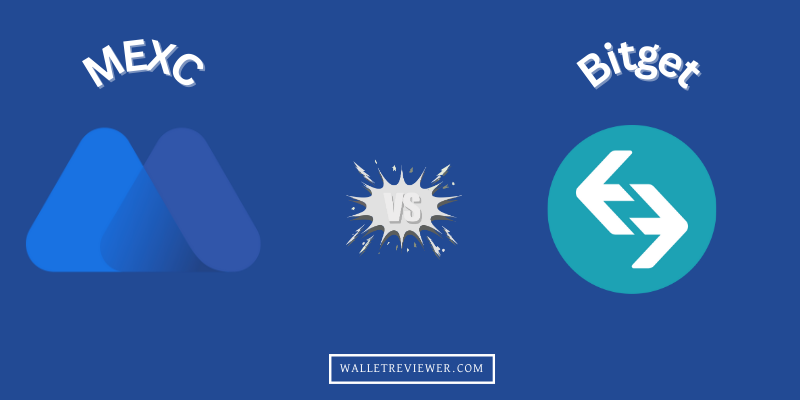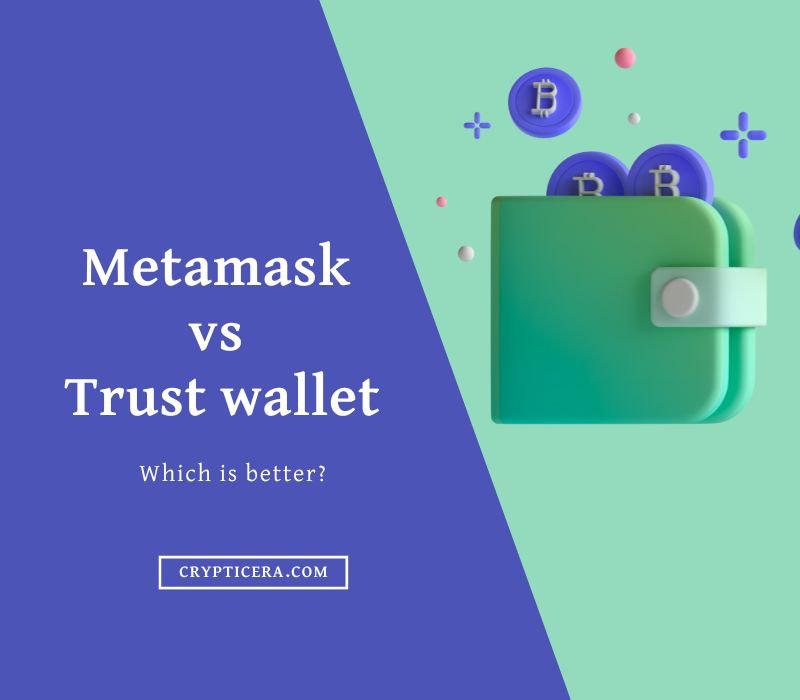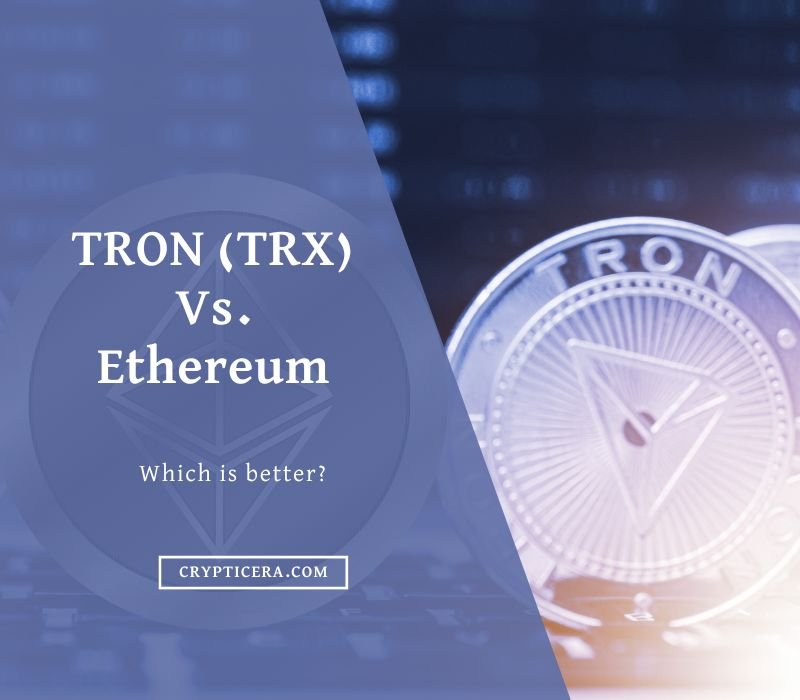Choosing between MEXC and Bitget crypto exchanges can be confusing, especially if you want low fees, high leverage, and easy trading options.
Both platforms are known for offering a wide range of coins, advanced futures trading, and support for copy trading. But there are many differences in their features, supported assets, fee structure, and user experience.
Some traders prefer MEXC for its no-KYC withdrawals and more altcoin options. Others trust Bitget for its strong reputation and better futures interface. In this guide, you will see a full comparison of MEXC vs Bitget to help you pick the right crypto exchange for your needs.
MEXC vs Bitget: Quick Comparison
| Factor | MEXC | Bitget |
|---|---|---|
| Founded | 2018 | 2018 |
| Headquarters | Victoria, Seychelles | Singapore |
| Trust Score (CoinGecko, 2025) | #8 | #6 |
| 24h Trading Volume (2025) | High (exact figures vary, often $1B+) | High |
| Supported Cryptocurrencies | 3,100+ coins, including altcoins and memecoins | 1,200+ coins, focus on major and select altcoins |
| Spot Trading Fees | 0% maker/taker for most pairs | 0.1% maker/taker |
| Futures Trading Fees | 0% maker, 0.02% taker | 0.02% maker, 0.06% taker |
| Fee Discounts | 10% discount with MX token | Discounts with BGB token |
| Deposit Fees | Free for crypto | Free for all assets, including fiat |
| Withdrawal Fees | ~0.00003 BTC for Bitcoin, varies by coin | ~0.00004 BTC for Bitcoin, 0 fees on BEP-20 |
| Fiat Deposit Support | No native fiat deposits, third-party (e.g., MoonPay) | Bank transfers (SEPA, ACH), Apple Pay, Google Pay |
| Fiat Withdrawal Support | Via third-party providers, fees vary | Native support (e.g., 0.5 EUR for SEPA) |
| KYC Requirements | Optional, up to 10 BTC daily withdrawal without KYC | Mandatory, simple process |
| Leverage (Futures) | Up to 200x | Up to 125x |
| Margin Trading | Yes | Yes, up to 5x leverage |
| Copy Trading | Available, with trader leaderboards | Industry-leading, 400,000+ traders, AI bots |
| Trading Bots | Yes, supports quantitative trading | Yes, advanced automated bots |
| Spot Trading | Yes, with 3,100+ pairs | Yes, 700+ pairs, streamlined selection |
| Futures Trading | Perpetual and traditional futures, COIN-M | Perpetual and inverse futures, USD-M |
| Options Trading | Available | Not available |
| Staking Options | Flexible staking, high APY promotions | Staking, dual investment, flexible savings |
| Launchpad/Launchpool | Extensive, supports early-stage projects | Available, involves BGB token |
| Security: 2FA | Yes, SMS or Google Authenticator | Yes, SMS or Google Authenticator |
| Security: Cold Storage | Majority of funds in cold wallets | Majority of funds in cold wallets |
| Security: Anti-Phishing Code | Yes | Yes |
| Security: Withdrawal Whitelist | Yes | Yes |
| Proof of Reserves | ~$1B in user assets | Over $3B in user assets |
| Security Score (Certik) | 81.82, A rating, 10th safest | 85.58, A rating, top 6 safest |
| Regulatory Compliance | Not regulated by major authorities | Regulated in Georgia, Netherlands, Kazakhstan, and Dubai |
| User Interface | Feature-rich, may be complex for beginners | Beginner-friendly, clean, and streamlined |
| Mobile App | Yes, robust functionality | Yes, highly rated for usability |
| Customer Support | 24/7, needs improvement | 24/7, proactive but mixed reviews |
| Liquidity | High, minimal slippage for large orders | High, strong for derivatives |
| Trading Volume | Substantial, supports efficient trading | High, among top 5 exchanges |
| Minimum Deposit | Not specified, low entry | 1 USDT |
| P2P Trading | Yes | Yes |
| Earn Products | High-risk/high-reward token events | Structured, low-risk products |
| Trading Tools | TradingView charts, advanced order types | TradingView charts, copy trading focus |
| Demo Account | Not mentioned | Yes, for testing strategies |
| Native Token | MX, used for fee discounts, staking | BGB, used for fee discounts, staking |
| Airdrop Programs | Frequent, large prize pools (e.g., 149,000 USDT) | Available, tied to events |
| Supported Countries | Global, available in U.S. without KYC | 150+ countries, restricted in US |
Read our in-depth MEXC review.
MEXC vs Bitget: No-KYC Trading
MEXC offers a robust no-KYC trading option, allowing users to withdraw up to 10 BTC daily without identity verification, appealing to privacy-focused traders.
This policy enables quick registration using only an email and password, with no mandatory KYC for basic trading and withdrawals, though some features like higher withdrawal limits (up to 200 BTC with advanced KYC) require verification.
Bitget, in contrast, mandates a simple KYC process for all users, requiring basic identity verification to access trading and withdrawal features. While this enhances security and compliance with global regulations, it limits anonymity compared to MEXC.
Bitget’s KYC is streamlined, taking minutes, but it lacks the no-KYC option MEXC provides. Both platforms balance privacy and security, but MEXC’s higher withdrawal limits without KYC (10 BTC vs. Bitget’s verified limits) make it more appealing for anonymous trading.
Read: Best no-KYC crypto exchanges
Winner: MEXC (MEXC wins due to its flexible no-KYC policy, allowing up to 10 BTC daily withdrawals without identity verification, ideal for privacy-conscious traders.)
MEXC vs Bitget: Supported Coins
MEXC supports over 3,100 cryptocurrencies and 3,600+ trading pairs, offering one of the largest selections among exchanges.
It excels in listing new altcoins and meme coins early, catering to traders seeking niche or early-stage projects. This extensive variety, including DeFi tokens and low-cap coins, makes MEXC a go-to for diversified portfolios.
Bitget supports over 1,200 coins and 1,700+ trading pairs, a substantial but smaller selection compared to MEXC. Bitget focuses on major cryptocurrencies and select altcoins, ensuring high liquidity for its offerings but lacking the breadth of MEXC’s low-cap coin support.
MEXC’s rapid listing of new tokens via its Launchpad provides early investment opportunities, while Bitget’s curated approach prioritizes established assets, appealing to traders focused on mainstream markets.
Data from CoinMarketCap ranks MEXC higher for coin variety, while Bitget’s streamlined selection reduces clutter for beginners. Both platforms support major coins like Bitcoin and Ethereum, but MEXC’s sheer volume of trading pairs (3,600+ vs. 1,700+) gives it an edge for traders exploring diverse assets.
Winner: MEXC (MEXC wins for its extensive support of over 3,100 coins and 3,600+ trading pairs, offering unmatched variety for traders seeking niche and new cryptocurrencies.)
MEXC vs Bitget: Trading Fees
MEXC boasts some of the lowest fees in the industry, with 0% maker and taker fees for spot trading and 0% maker and 0.02% taker fees for futures trading. Holding MX tokens grants an additional 10% discount on taker fees, making MEXC highly cost-effective, especially for high-frequency traders.
Bitget charges 0.1% for both maker and taker fees on spot trading and 0.02% maker and 0.06% taker fees for futures. BGB token holders receive a 20% fee discount.
MEXC’s zero-fee spot trading and lower futures fees outshine Bitget’s standard rates, which align with industry averages but don’t compete with MEXC’s cost savings.
MEXC also offers periodic zero-fee trading events. Both platforms charge minimal withdrawal fees (e.g., ~0.00003 BTC for Bitcoin), but MEXC’s overall fee structure is more economical.
Winner: MEXC (MEXC wins with its 0% spot trading fees and lower futures fees (0.02% taker vs. Bitget’s 0.06%), providing significant cost savings for traders.)
MEXC vs Bitget: Trading Features Compared
MEXC offers a comprehensive suite of trading features, including spot, futures (up to 200x leverage), options, margin trading, and copy trading.
Its Unified Trading Account allows seamless asset management across markets, and its Launchpad supports early-stage project investments. MEXC’s trading interface integrates TradingView charts and advanced order types (e.g., limit, market, GTC), catering to both beginners and professionals.
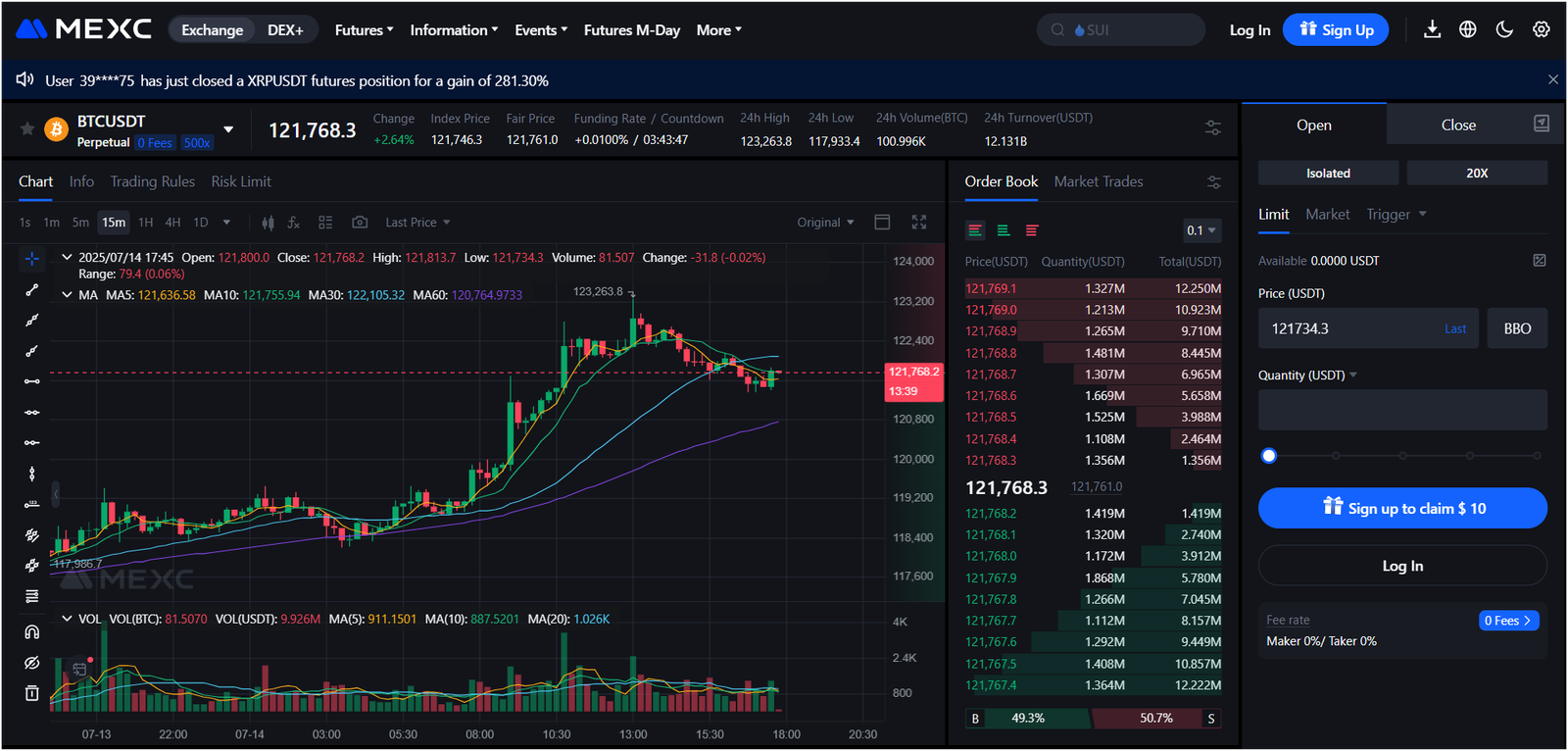
Bitget excels in copy trading, with over 400,000 traders and AI-powered bots, making it the industry leader in this feature. It supports spot, futures (up to 125x leverage), and margin trading, with a user-friendly interface optimized for novices.
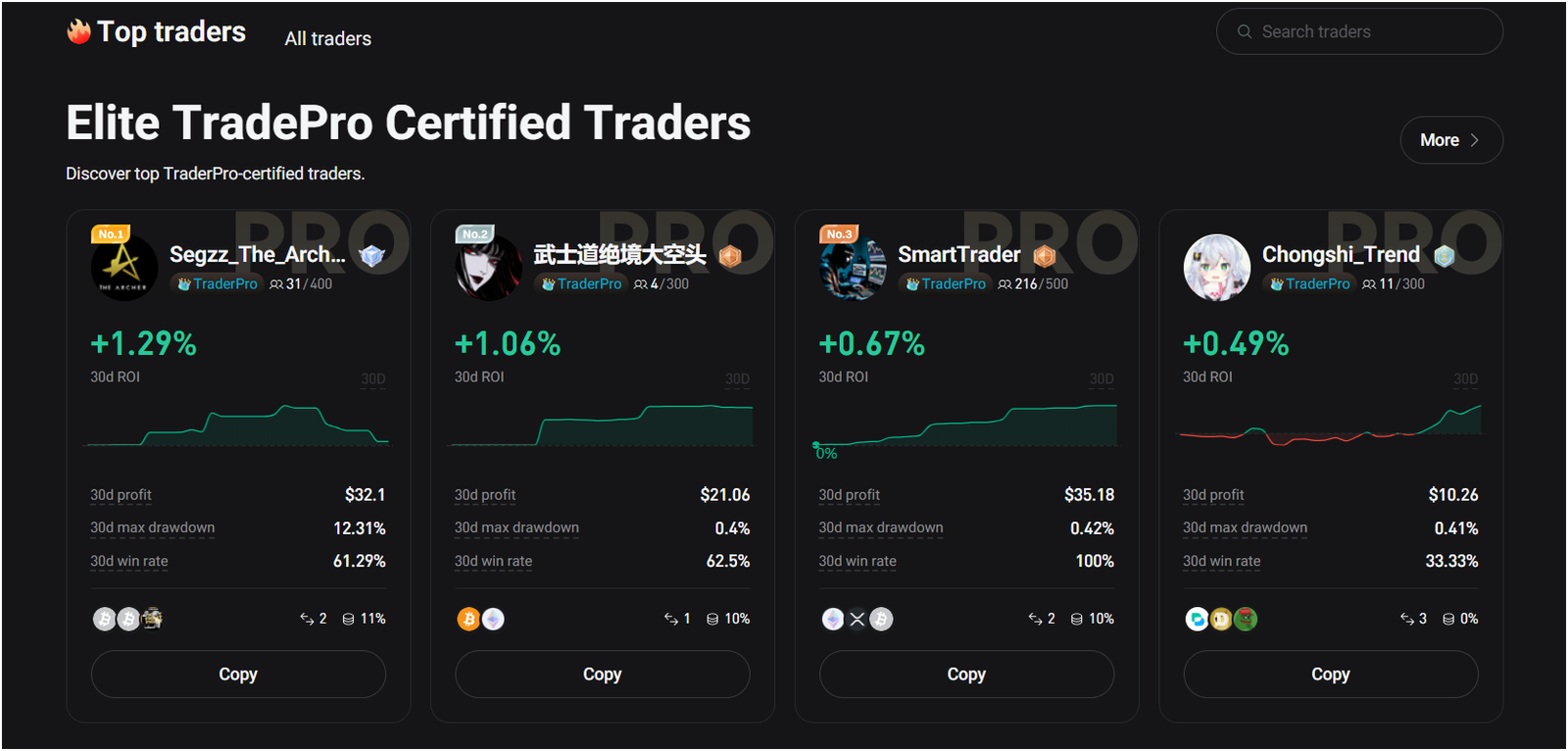
Bitget’s DeFi wallet and staking options enhance its ecosystem, but it lacks options trading, unlike MEXC. Both platforms offer trading bots, but Bitget’s copy trading is more robust, while MEXC’s higher leverage and broader derivatives (480+ futures pairs) appeal to advanced traders. MEXC’s demo trading feature aids beginners, while Bitget’s intuitive UI simplifies navigation.
Winner: Bitget (Bitget wins for its superior copy trading platform and beginner-friendly interface, making it more accessible despite MEXC’s broader feature set.)
Bitget vs MEXC: Who Wins?
Choosing between MEXC and Bitget depends on trading priorities. MEXC excels for traders seeking low fees (0% spot, 0.02% futures taker), vast coin variety (3,100+ coins), and no-KYC trading (up to 30 BTC daily withdrawals).
Its high leverage (200x) and Launchpad for early token access appeal to aggressive traders and altcoin enthusiasts. However, its interface can feel complex for beginners, and customer support has mixed reviews.
Bitget shines for its user-friendly platform, industry-leading copy trading (400,000+ traders), and regulatory compliance in jurisdictions like Australia and Dubai. Its fees (0.1% spot, 0.06% futures taker) are higher, and its coin selection (1,200+) is smaller, but its DeFi wallet and staking options add value.
Bitget’s mandatory KYC reduces anonymity but enhances security. For privacy, cost, and coin diversity, MEXC leads; for ease of use and copy trading, Bitget is superior.
Winner: MEXC (MEXC wins for its lower fees, extensive coin selection, and no-KYC flexibility, catering to a broader range of trading needs.)
Is MEXC Better Than Bitget for Beginners?
Bitget is generally better for beginners due to its streamlined, user-friendly interface and robust copy trading feature, which allows novices to follow over 400,000 professional traders with transparent performance metrics.
Its mandatory but simple KYC process takes minutes, ensuring quick onboarding, and its clean design minimizes the learning curve. Bitget’s demo account lets beginners practice without risk, and its staking and earn products are straightforward.
MEXC, while offering a demo trading feature and no-KYC access, has a more complex interface due to its extensive features (e.g., 3,600+ trading pairs, 200x leverage). This can overwhelm new users, despite its zero-fee spot trading being cost-effective.
MEXC’s focus on altcoins and advanced tools suits experienced traders, but its customer support is less responsive, per Trustpilot reviews. Bitget’s intuitive platform and copy trading make it more approachable, though MEXC’s low fees and demo mode are beginner-friendly. For simplicity and guided trading, Bitget is the better choice.
Related: Bitget Review
MEXC Pros and Cons
Pros:
- Zero spot trading fees and low futures fees (0.02% taker).
- Supports over 3,100 coins and 3,600+ trading pairs.
- No-KYC trading with up to 30 BTC daily withdrawal limit.
- High leverage (up to 200x) for futures trading.
- Launchpad for early access to new tokens.
- Robust security with no major breaches and 81.82 Certik score.
- Demo trading for practice.
- Frequent airdrops and promotional events.
Cons:
- Complex interface may overwhelm beginners.
- Limited fiat deposit/withdrawal options (third-party only).
- Customer support has mixed reviews, often slow.
- Less regulatory oversight compared to Bitget.
Bitget Pros and Cons
Pros:
- Industry-leading copy trading with 400,000+ traders and AI bots.
- User-friendly interface, ideal for beginners.
- Competitive futures fees (0.02% maker, 0.06% taker) with BGB discounts.
- Supports 1,200+ coins with high liquidity.
- Strong regulatory compliance (licenses in Australia, Dubai).
- $300M protection fund and transparent proof-of-reserves.
- DeFi wallet and diverse staking options.
- Highly rated mobile app for seamless trading.
Cons:
- Mandatory KYC reduces anonymity.
- Higher fees than MEXC (0.1% spot, 0.06% futures taker).
- Smaller coin selection (1,200+ vs. MEXC’s 3,100+).
Read more articles:
